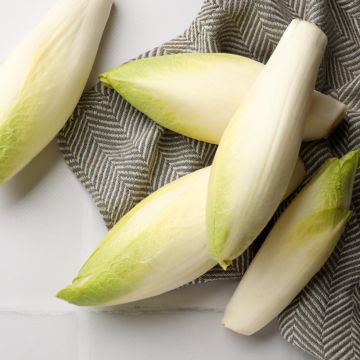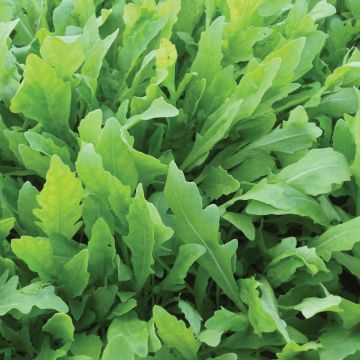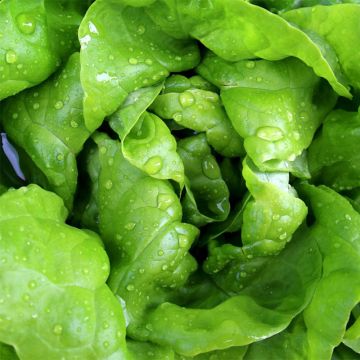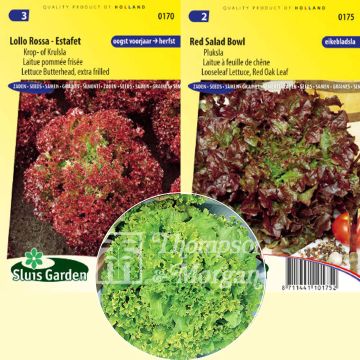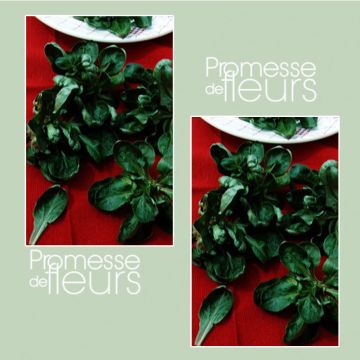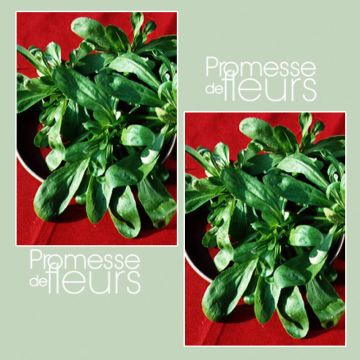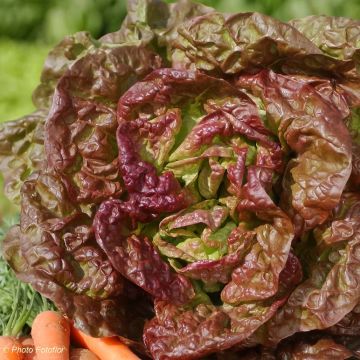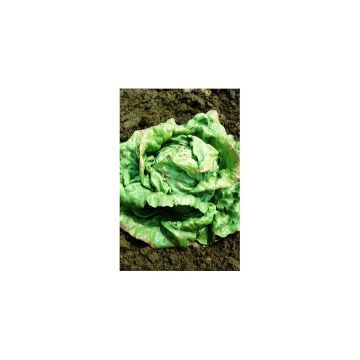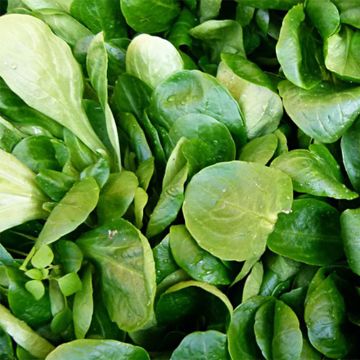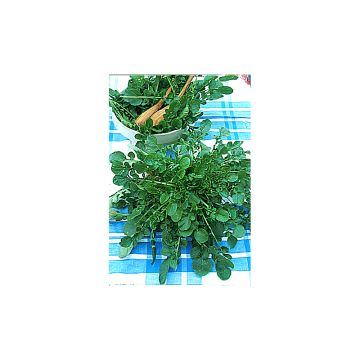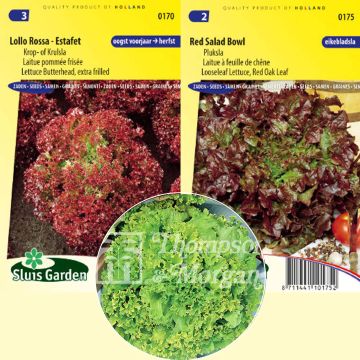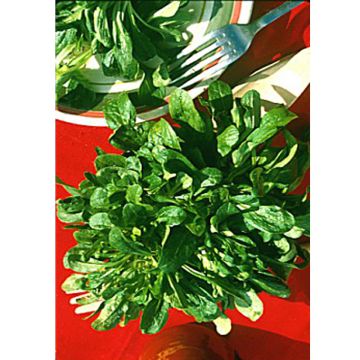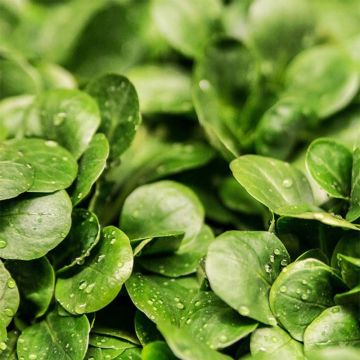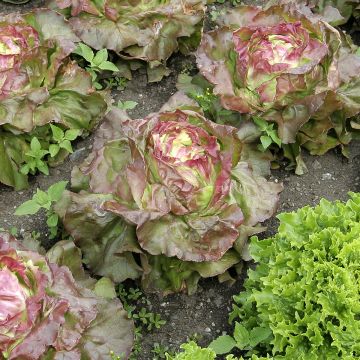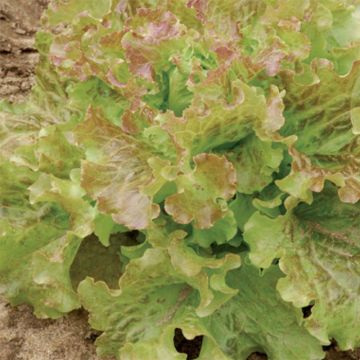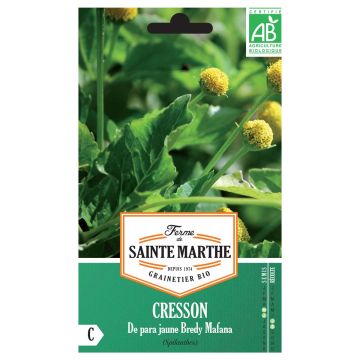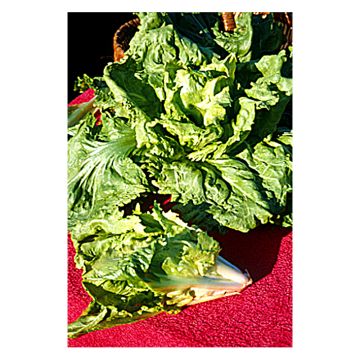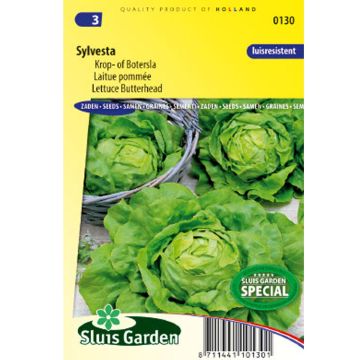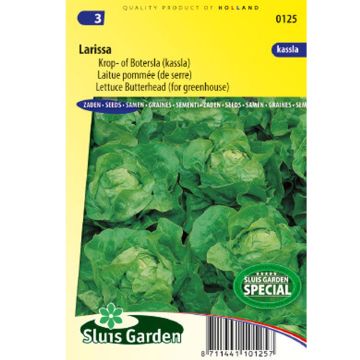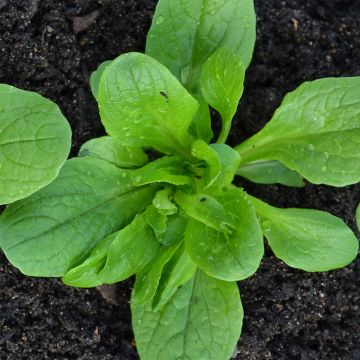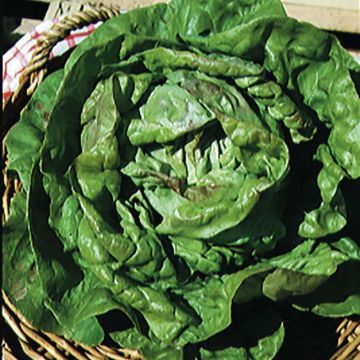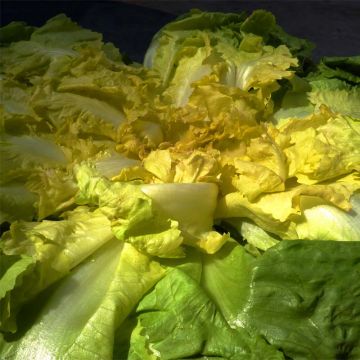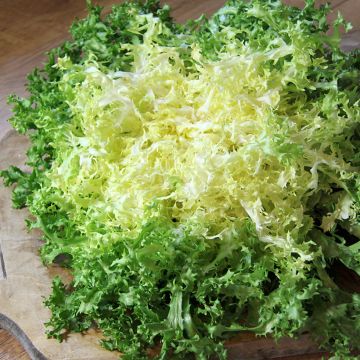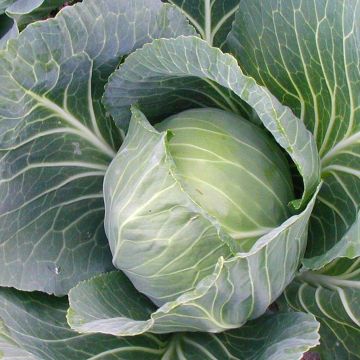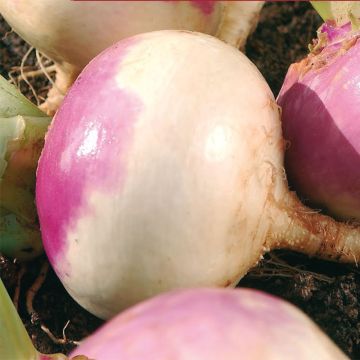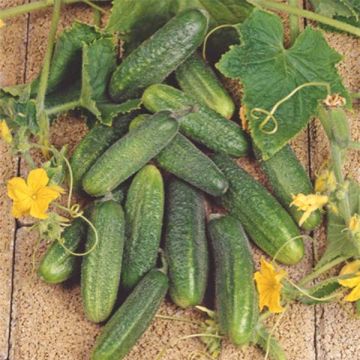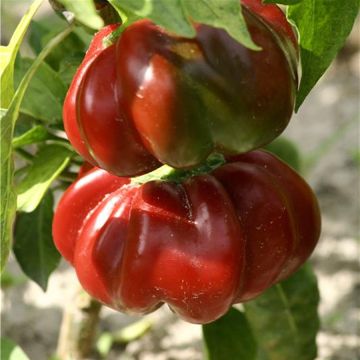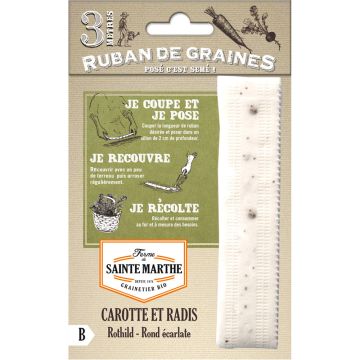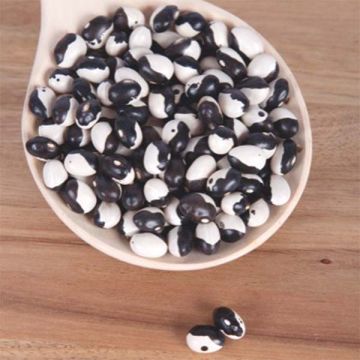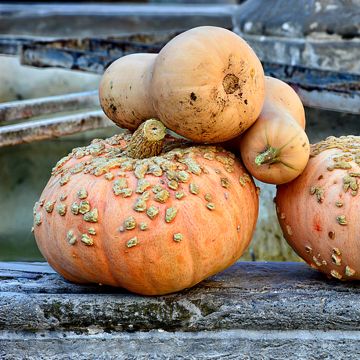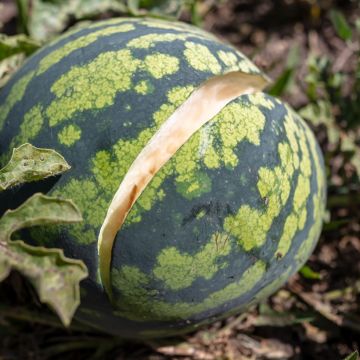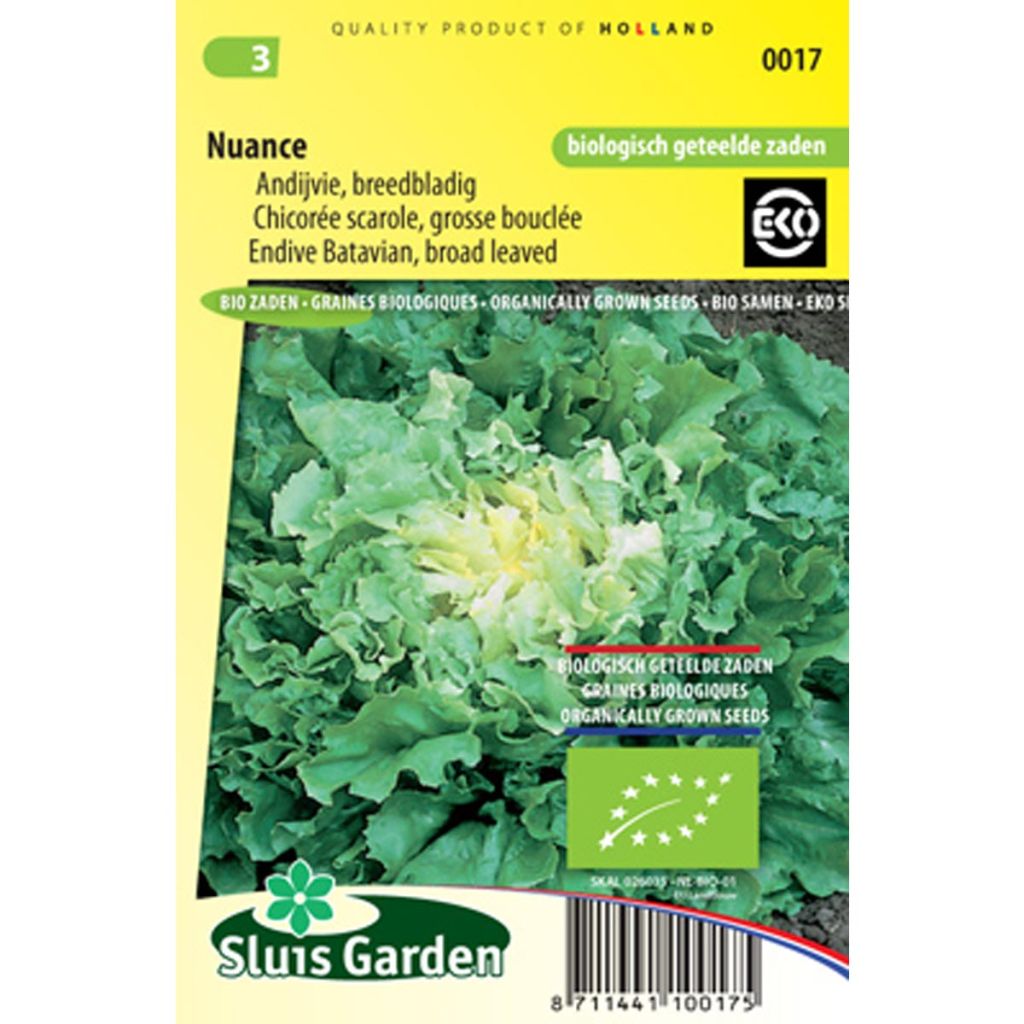

Escarole Nuance
Escarole Nuance
Cichorium endivia var. latifolium Nuance
Batavian endive, broad-leafed endive, Chicory
Why not try an alternative variety in stock?
View all →This plant carries a 6 months recovery warranty
More information
We guarantee the quality of our plants for a full growing cycle, and will replace at our expense any plant that fails to recover under normal climatic and planting conditions.
Seed-only orders are dispatched by sealed envelope. The delivery charge for seed-only orders is €3.90.
Description
'Nuance' Escarole is an improved strain of the popular French variety ‘Grosse Bouclée’. This bolt-resistant, fast-maturing and productive Batavian endive forms large rosettes of broad, curled and crisp leaves that are naturally self-blanching. Delicious eaten raw in salads or cooked like spinach. Sow under cover from March to May or outdoors from May to August for harvests almost all year round.
Escarole is a herbaceous plant that belongs to the Asteraceae family. It bears the Latin name Cichorium endivia latifolium and is also known as broad-leaved endive, Batavian endive or chicory. Along with Frisée endive, it is a “true” endive as opposed to the a closely related species, Cichorium endivia (examples of which include radicchio, witloof and sugarloaf).
Escarole produces rosettes of large, green wavy leaves surrounding a pale yellow to white heart. Whilst some varieties are naturally self-blanching, others need to be deprived of light or “blanched” to subdue some of their bitterness. Blanching also results in a more tender leaf texture. Escarole is not as cold hardy as wild chicory. In colder regions, provide winter crop covers such as fleece or polythene sheeting. It prefers moderately rich, cool, well-drained soil.
Escarole brings a lovely, bitter edge to mixed salads; it is delicious sautéed, braised or cooked in bechamel sauce. Chicory boasts numerous health benefits, including boosting the immune system, easing digestion and reducing inflammation.
Harvesting: pick the leaves as and when required
Storage: escarole greens will keep for a few days in the refrigerator
Good to know: hoeing and weeding around your plants regularly will help keep the weeds in check. Mulching is a great way to keep the soil moist, especially during dry spells.
NB. Organic seeds (in French "AB" for "Agriculture Biologique") are produced from plants that aren't treated with phytosanitary products (insecticides, weed killers). The seeds do not undergo post-harvest treatment. They carry the AB label and are approved by Ecocert, an independent structure.
Report an error about the product description
Harvest
Plant habit
Foliage
Botanical data
Cichorium
endivia var. latifolium
Nuance
Asteraceae
Batavian endive, broad-leafed endive, Chicory
Cultivar or hybrid
Biennial
Other Salad leaf seeds
Planting and care
Sowing:
Sow lightly in shallow flat-bottomed drills, about 5 cm wide and 2 cm deep. Leave 30 cm between each row. Cover the seeds lightly and water. Germination takes 8 days on average. Thin out the seedlings, keeping one every 30 cm. If necessary, they can be transplanted when the seedlings reach the 7-8 leaf stage.
Care:
To avoid diseases such as downy mildew or leaf spot, weed and hoe around your plants regularly and make sure to rotate your crops every 3 to 4 years. Given that Escarole endive is less frost-resistant than common chicory, its best to protect your plants with crop covers during the colder winter months.
Seedlings
Care
Intended location
This item has not been reviewed yet - be the first to leave a review about it.
Vegetable seeds
Haven't found what you were looking for?
Hardiness is the lowest winter temperature a plant can endure without suffering serious damage or even dying. However, hardiness is affected by location (a sheltered area, such as a patio), protection (winter cover) and soil type (hardiness is improved by well-drained soil).

Photo Sharing Terms & Conditions
In order to encourage gardeners to interact and share their experiences, Promesse de fleurs offers various media enabling content to be uploaded onto its Site - in particular via the ‘Photo sharing’ module.
The User agrees to refrain from:
- Posting any content that is illegal, prejudicial, insulting, racist, inciteful to hatred, revisionist, contrary to public decency, that infringes on privacy or on the privacy rights of third parties, in particular the publicity rights of persons and goods, intellectual property rights, or the right to privacy.
- Submitting content on behalf of a third party;
- Impersonate the identity of a third party and/or publish any personal information about a third party;
In general, the User undertakes to refrain from any unethical behaviour.
All Content (in particular text, comments, files, images, photos, videos, creative works, etc.), which may be subject to property or intellectual property rights, image or other private rights, shall remain the property of the User, subject to the limited rights granted by the terms of the licence granted by Promesse de fleurs as stated below. Users are at liberty to publish or not to publish such Content on the Site, notably via the ‘Photo Sharing’ facility, and accept that this Content shall be made public and freely accessible, notably on the Internet.
Users further acknowledge, undertake to have ,and guarantee that they hold all necessary rights and permissions to publish such material on the Site, in particular with regard to the legislation in force pertaining to any privacy, property, intellectual property, image, or contractual rights, or rights of any other nature. By publishing such Content on the Site, Users acknowledge accepting full liability as publishers of the Content within the meaning of the law, and grant Promesse de fleurs, free of charge, an inclusive, worldwide licence for the said Content for the entire duration of its publication, including all reproduction, representation, up/downloading, displaying, performing, transmission, and storage rights.
Users also grant permission for their name to be linked to the Content and accept that this link may not always be made available.
By engaging in posting material, Users consent to their Content becoming automatically accessible on the Internet, in particular on other sites and/or blogs and/or web pages of the Promesse de fleurs site, including in particular social pages and the Promesse de fleurs catalogue.
Users may secure the removal of entrusted content free of charge by issuing a simple request via our contact form.
The flowering period indicated on our website applies to countries and regions located in USDA zone 8 (France, the United Kingdom, Ireland, the Netherlands, etc.)
It will vary according to where you live:
- In zones 9 to 10 (Italy, Spain, Greece, etc.), flowering will occur about 2 to 4 weeks earlier.
- In zones 6 to 7 (Germany, Poland, Slovenia, and lower mountainous regions), flowering will be delayed by 2 to 3 weeks.
- In zone 5 (Central Europe, Scandinavia), blooming will be delayed by 3 to 5 weeks.
In temperate climates, pruning of spring-flowering shrubs (forsythia, spireas, etc.) should be done just after flowering.
Pruning of summer-flowering shrubs (Indian Lilac, Perovskia, etc.) can be done in winter or spring.
In cold regions as well as with frost-sensitive plants, avoid pruning too early when severe frosts may still occur.
The planting period indicated on our website applies to countries and regions located in USDA zone 8 (France, United Kingdom, Ireland, Netherlands).
It will vary according to where you live:
- In Mediterranean zones (Marseille, Madrid, Milan, etc.), autumn and winter are the best planting periods.
- In continental zones (Strasbourg, Munich, Vienna, etc.), delay planting by 2 to 3 weeks in spring and bring it forward by 2 to 4 weeks in autumn.
- In mountainous regions (the Alps, Pyrenees, Carpathians, etc.), it is best to plant in late spring (May-June) or late summer (August-September).
The harvesting period indicated on our website applies to countries and regions in USDA zone 8 (France, England, Ireland, the Netherlands).
In colder areas (Scandinavia, Poland, Austria...) fruit and vegetable harvests are likely to be delayed by 3-4 weeks.
In warmer areas (Italy, Spain, Greece, etc.), harvesting will probably take place earlier, depending on weather conditions.
The sowing periods indicated on our website apply to countries and regions within USDA Zone 8 (France, UK, Ireland, Netherlands).
In colder areas (Scandinavia, Poland, Austria...), delay any outdoor sowing by 3-4 weeks, or sow under glass.
In warmer climes (Italy, Spain, Greece, etc.), bring outdoor sowing forward by a few weeks.

































